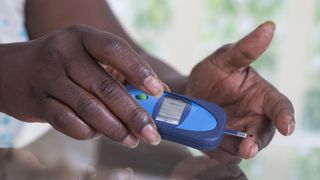According to an article (opens in new tab) on Korea IT News, the next Samsung smartwatch (opens in new tab) could include a non-invasive blood glucose monitoring feature. Non-invasive testing is something we’re seeing more of among the best glucose meters (opens in new tab), but the idea of having it in a wearable is exciting. It’s important to remember that this is just rumor right now – Samsung hasn’t released any official confirmation, beyond stating back in January 2020 that it was working on a non-invasive blood glucose monitoring method. According to the Korea IT News article, this feature could appear on the Galaxy Watch 4 or the Galaxy Watch Active 3, touted for release in the second half of 2021 (again, this hasn’t been confirmed).
Samsung smartwatch blood glucose monitor: What we know
Officially we know nothing in relation to the next Samsung smartwatch offering non-invasive blood glucose monitoring. But last January the company issued a press release (opens in new tab) explaining how its researchers, in collaboration with the Massachusetts Institute of Technology (MIT) had, ‘developed an innovative, non-invasive method for monitoring blood glucose levels that utilizes a technique known as Raman spectroscopy.’ According to Samsung, raman spectroscopy demonstrates the ‘highest prediction accuracies among non-invasive technologies.’ This rumored inclusion of blood glucose monitoring on a Samsung Galaxy Watch would give diabetics regular updates on their blood sugar levels, displayed in a companion app, so that they can adjust their food intake, exercise, and insulin dose (if they take it) for the day. Best of all, no finger-pricking would be needed.
Can a smartwatch really monitor blood glucose?
Samsung isn’t the first company to develop blood sugar testing technology for wearable devices. In fact, other rumors suggest that Apple is working on something similar for its next fitness tracker (opens in new tab) watch. At present, the Apple Watch can’t monitor your glucose levels in the way Samsung’s developing technology could. That’s because, to access blood glucose monitoring on Apple Watch, you have to pair it with a continuous monitoring system such as the FreeStyle Libre or Dexcom, or a manual testing system. At CES this year, Japanese startup Quantum Operation introduced (opens in new tab) a smartwatch prototype designed with a small optical spectrometer to measure glucose levels in 20 seconds. With one in ten Americans now diagnosed with diabetes, according to CDC research (opens in new tab), there is likely to be huge demand for a diabetes monitor in watch form, if they can get FDA clearance. Traditional glucometers are designed to produce accurate and fast readings, with smart (app-connected) devices capable of storing multiple readings so that you can identify any changes or trends. The issue with many of these existing devices is that they require you to prick (lance) your finger to produce blood for a reading. When you’re doing that multiple times a day, it soon becomes frustrating. If a wearable device can offer monitoring in a non-invasive way, and still produce reliable, fast and accurate readings, we could one day witness a sea-change in the world of blood sugar meters. That said, the types of smartwatches we’re talking about here are likely to be very expensive, and so might be out of reach for many diabetics. So while this technology is exciting, it has a way to go before it proves itself as a trustworthy and affordable replacement.






